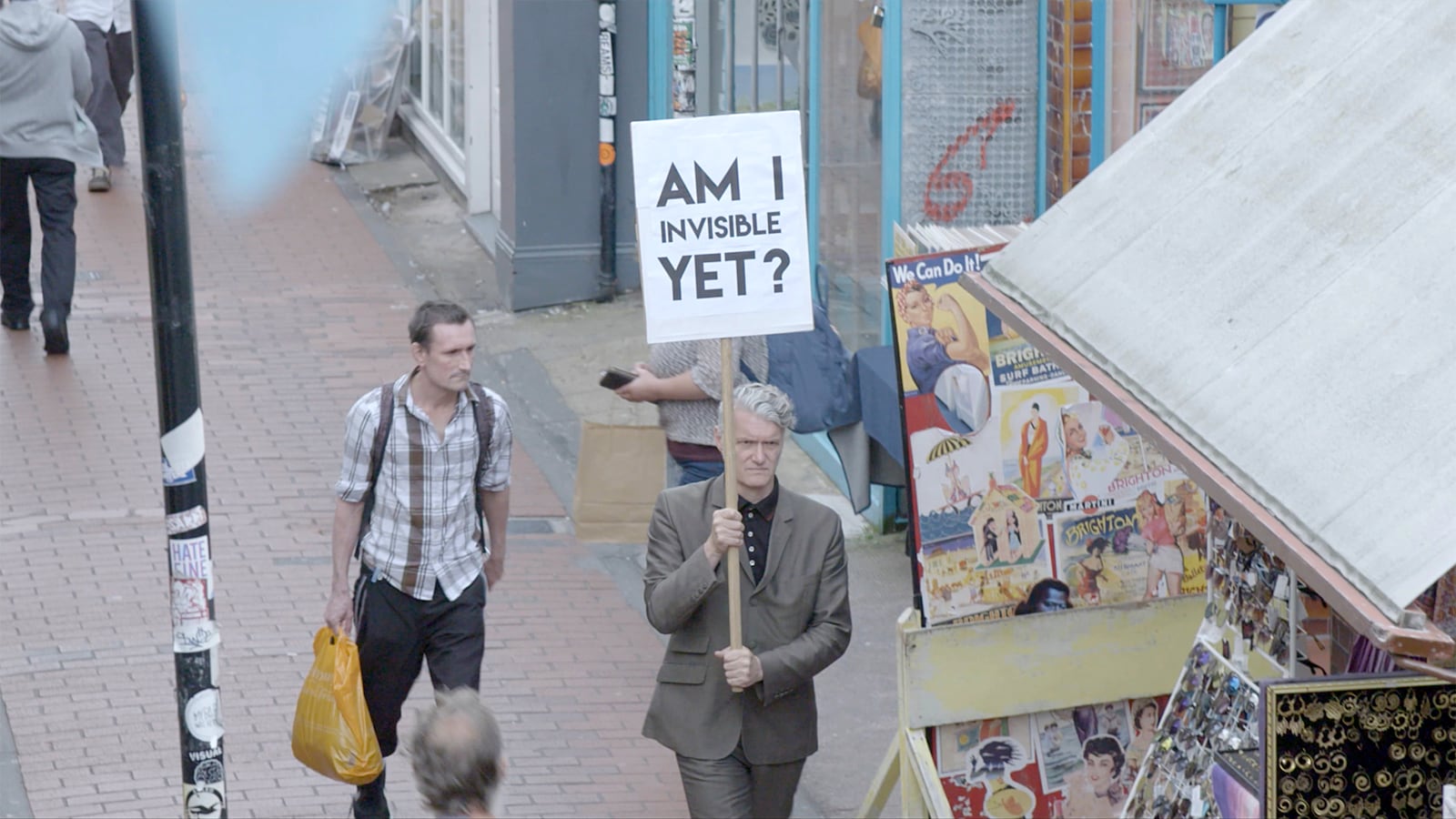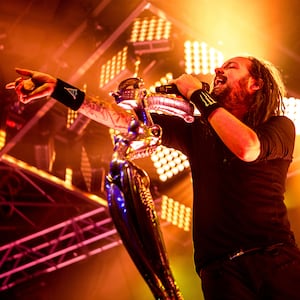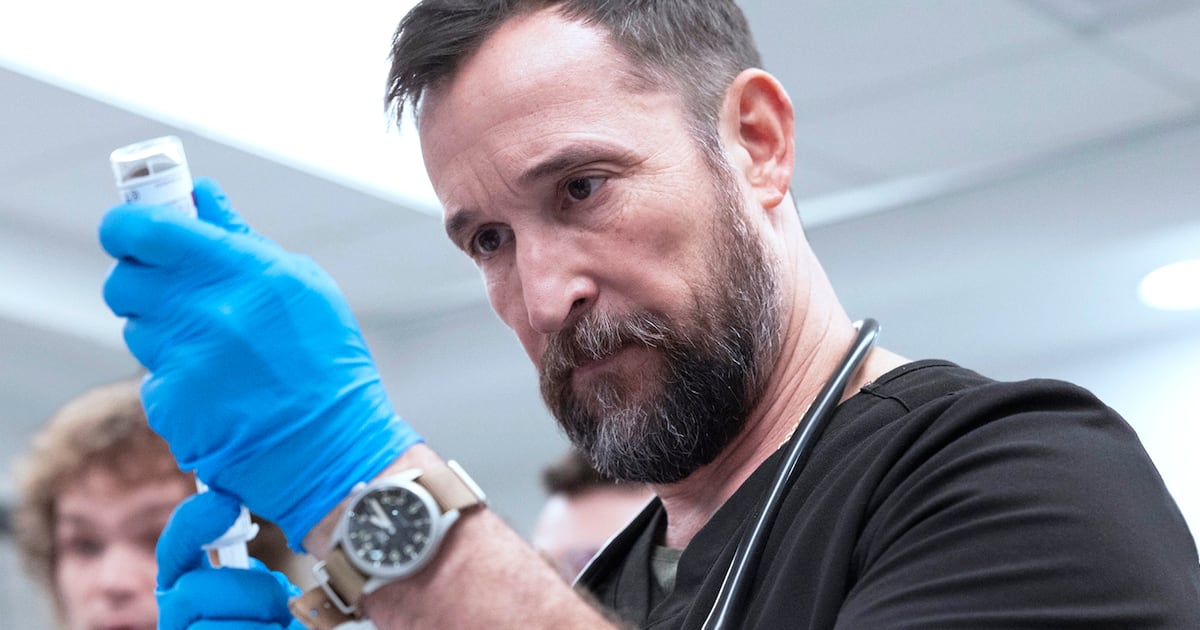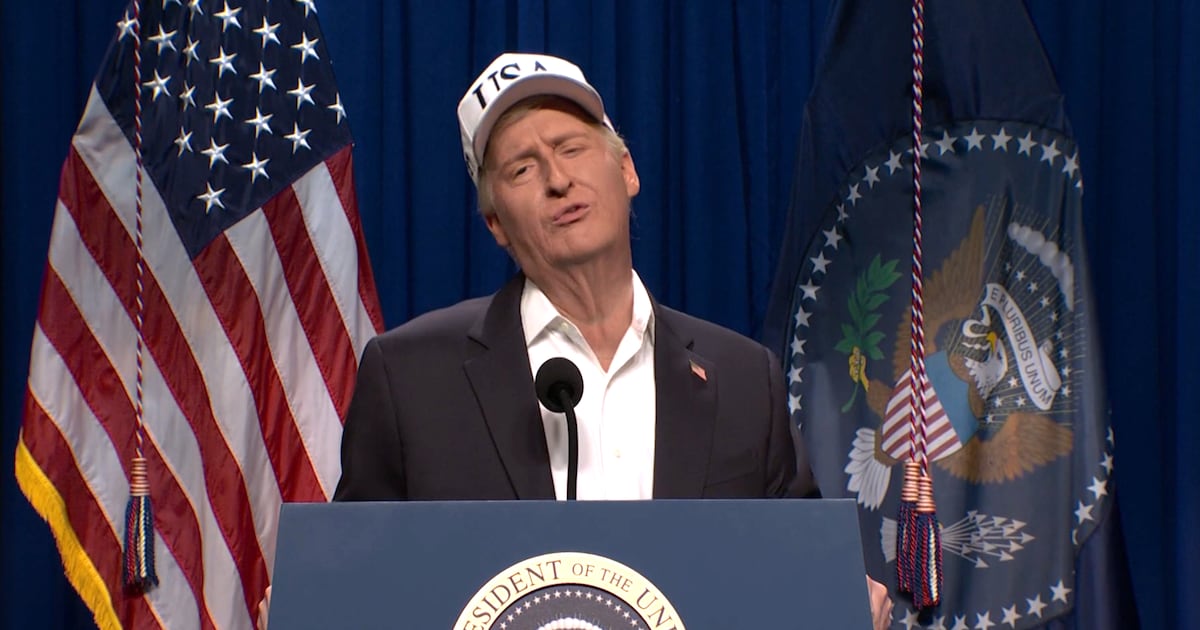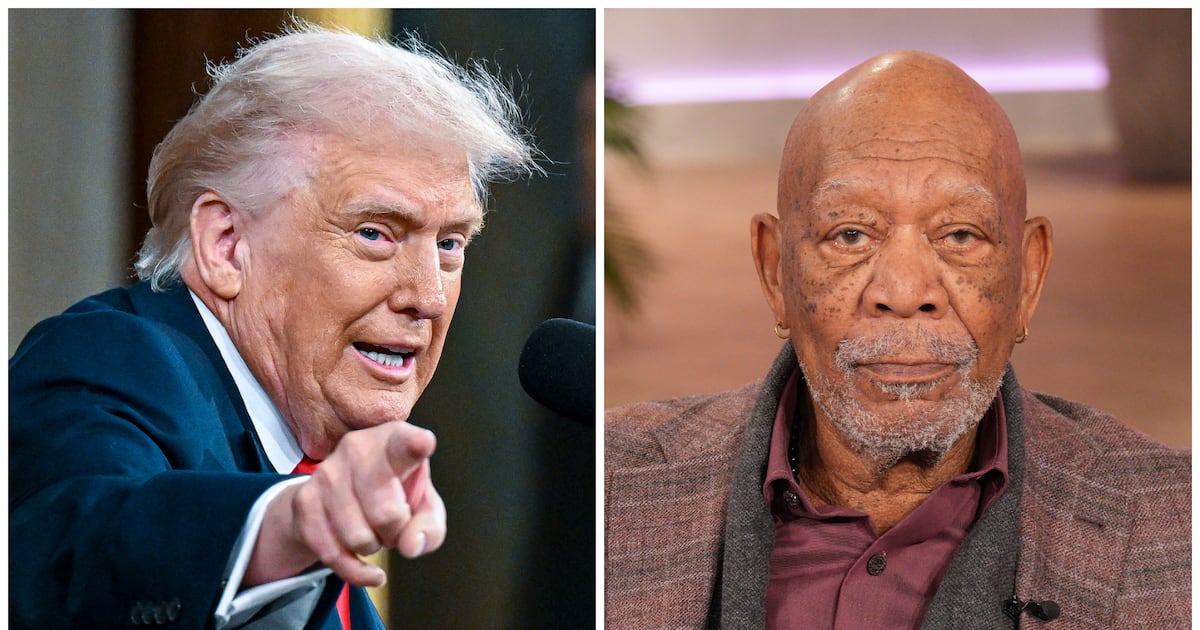The year is 1997. You are listening to the car radio. You are at a party. You are at a bar, the drug store, a wedding, your bedroom, or in your living room watching TV. It doesn’t matter where you were because it was everywhere, being sung by everyone. It still hasn’t stopped.
Your dad was banging his head to the beat. “I get knocked down / But I get up again / You are never gonna keep me down.” (Dads lived for this song.) But your mom chimes in, too, bashful and feeling a little bit naughty as her falsetto kicks in: “Pissing the night away…”
Meanwhile you, your friends, and your siblings have been doing your studious best to memorize the correct order of things, as if you were clocking times tables or state capitals. “He drinks a Whiskey drink / He drinks a Vodka drink / He drinks a Lager drink / He drinks a Cider drink.”
Even Barbara Walters was leading the audience of The View in a chant.
Yes, it was 1997. The NASA Pathfinder had landed on Mars. The Hale-Bopp comet had its closest approach to Earth. A boy-wizard named Harry Potter was being introduced to readers, the world was mourning Princess Diana, O.J. Simpson was found guilty, Mike Tyson bit an ear, and a quiet, tiny film called Titanic hit theaters. And through it all? We were “Tubthumping.”
The massive hit from British rock band Chumbawamba has, in the 25 years since it first set up a permanent residence on the airwaves and in our collective brains—where it will live until the world ceases to exist—been considered one of the quintessential examples of a “one-hit wonder.” The song was as inescapable as a person’s own shadow. Even now, all these years, fads, and musical tastes later, you’d be hard-pressed to find a person not amped to belt-scream every word.
But what if we are the ones who were confused? Or maybe misled. Misinformed. Perhaps, even, oblivious. A one-hit wonder? Technically speaking, yes, that’s what Chumbawamba was. But in reality, the group—and that song—were so much more. For over a decade before “Tubthumping” was a mainstay on the radio alongside the Spice Girls, Oasis, and Toni Braxton, the group was one of the most noted anarcho-punk bands in Europe. “Tubthumping” was a hit, but it was also a Trojan horse.
Make whatever you want out of that anthem. Tune in to see them on your favorite talk shows. But in turn, you’re exposing yourself to the deeper message of a politically pissed off, dissenting, fed-up band of musicians who had a thought: What if we made a record that took us to the mainstream, and then we subverted it all? What if, by masquerading as pop stars, we could change the world?
There’s maybe an even more pressing question, asked with the context of time all these years later. Basically: Did it work? And if not, was the effort even worth it?
That’s what the new documentary, I Get Knocked Down, is concerned with. The film played this weekend at the SXSW Film Festival, and counts Chumbawamba member Dunstan Bruce as its co-director, central figure, and existential inquisitor.
The film is squarely not a talking-heads history of Chumbawamba, or any sort of hagiography. There are surreal hauntings from a giant man wearing a plastic version of the demonic baby head that appeared on the group’s big album, Tubthumper. The film revisits every major anarchic stunt the group pulled while it had the world’s attention, and it’s a creaky-knee crisis of aging, with Bruce wondering what role he can still play in a movement of change—and if bringing Chumbawamba and its mission back into public consciousness could help the fight.
“We took a lot of the spirit of what Chumbawamba was about: always trying to change what we do, always trying to surprise our audience, and always trying to do something different,” Bruce tells The Daily Beast. “And I think that’s what we tried to do with the film.”
Bruce is not what you might imagine when you think about punk anarchists who are still fighting the good fight. There’s no all-black ensemble, renegade hairstyle, or canvas of tattoos proudly on display. Instead, his uniform consists of some of the most envy-inducing bespoke suits a proper dapper man could wish for, as well as a trendy haircut that’ll have you reaching for a hat to cover up your own unworthy mop.
Even his I Get Knocked Down co-director, Sophie Robinson, refuses to believe that he wasn’t wearing dungarees or a crazy hat when they first met. Sure, we might have preconceived notions of someone, but people change. But a natty double-breasted blazer can’t conceal the unbridled spirit that, decades later, still burns bright underneath. It’s that spirit, not to mention how to use it for good and for proper impact, that Bruce is concerned with.
We’re meeting the afternoon following the film’s SXSW premiere in Austin. He drinks an oatmeal latte drink. I drink a cold brew drink. (Even anarchists make sensible beverage choices once they reach a certain age, lyrics be damned.)
But the conversation, it really is about what happens when you get knocked down and then get up again. And wondering if, times seeming as dire and hopeless as they do, it’s possible to still defy and maintain that they’re never gonna keep us down.
“We’re aware of the fact that the film is very niche,” Bruce says. “There’s this phrase in the U.K., where you say, ‘It’s a bit Marmite,’ which means you either completely love it, or you completely hate it.” It’s a polarizing reaction that he’s spent nearly four decades getting used to—and relishing.

The band Chumbawamba in their heyday
ShutterstockHere are some things that Chumbawamba did while having the most popular song in the world:
Band member Alice Nutter spoke against the miscarriage of justice by saying that she and the group “like it when cops get killed.” On Bill Maher’s Politically Incorrect, she encouraged people to steal their CD from major retailers who didn’t need their money.
When brands came calling to license the song commercially, they agreed to the opportunities, but cheekily. General Motors paid nearly six figures to use a Chumbawamba song in an ad. The group then donated the money to anti-corporate activist groups.
During their performance on The Late Show With David Letterman, they added a verse to “Tubthumping” advocating in support of death row prisoner Mumia Abu-Jamal. When they performed at the BRIT Awards during the Liverpool Dockworkers’ Strike, they changed the “Tubthumping” lyrics to, "New Labour sold out the dockers, just like they’ll sell out the rest of us.”
At the ceremony, vocalist Danbert Nobacon climbed on one of the banquet tables, lifted a bucket filled with ice water meant to chill wine and champagne, and dumped it over the head of UK Deputy Prime Minister John Prescott.
And that’s not to mention the two decades of smaller-scale stunts that preceded their time on the world stage.
Part of Bruce’s insistence on not creating a music-doc hagiography of Chumbawamba meant asking humble questions. The biggest one: Did any of that matter? Or, rather, did anyone even notice?
Even the record label president who signed the band wonders in I Get Knocked Down if all the stunts went over the heads of fans, who listened to the song on pop radio and perhaps had no idea of their long history of activism.
“I think there was a lot of that, yeah,” Bruce says. “People just thought we were a novelty act from England and just enjoyed us for what it was. Then the song was adopted by everything I despised about sports culture. It got adopted by jocks everywhere.”
But even the record label was inadvertently in on the Trojan-horse mission. The song was so popular that Universal released a limited edition single of the track, back when people bought singles. It was a cynical marketing ploy, but it paid off in the band’s favor. “When they ran out, it made people buy our album. That gave people the chance to listen to the message and our record.”
The fact of the matter is, though, that “Tubthumping” was a radio staple alongside the likes of “Quit Playing Games With My Heart” by Backstreet Boys, “Wannabe” by Spice Girls, “Foolish Games” by Jewel, and even the Princess Diana tribute song “Candle in the Wind” by Elton John. It’s safe to say that the target demographic may not have been primed to search for political meaning in the Chumbawamba song that joined that playlist.
“‘MMMBop’ was at the same time as us,” Bruce says. At one point Chumbawamba was booked on the same concert bill at a theme park with Hanson, the group of gee-golly, barely pubescent brothers from Oklahoma singing in harmony. “That’s how bonkers it got for us. It was one of those moments where you think, ‘Are we doing the right thing here? Should we still be doing this?’”
The answer was yes, but it wasn’t an easy yes. It was a qualified yes. It mattered to the group what they were going to do with all of the opportunities—theme parks or otherwise.
Chumbawamba was big on the radio station concert circuit at that time. The end-all, be-all of that is New York’s Jingle Ball, which is put on each holiday season by the massively influential Z100 station at Madison Square Garden. That year, Chumbawamba was on the bill alongside all of those aforementioned pop acts. They brushed shoulders backstage with Céline Dion and Aerosmith.
Part of the gimmick at the event was a second stage in the middle of the arena that was fashioned to look like a boxing ring. That’s where Chumbawamba was booked. The group wanted to stay true to themselves, pop-star coronation be damned. So they opened their set by singing an a capella anti-fascist protest anthem. (And then transitioned into “Tubthumping.”)
“We were always trying to subvert the mainstream,” Bruce says. “And it was difficult. It was hard. But we had a lot of fun trying. I think that’s all you can do, really. I think you just have to let the message be that ‘at least we tried.’ At least we tried to do something. Whether we were successful or not, I’m not the one to judge us. But I think my measure is at least we tried to do something.”
As generous as “at least we tried” is, it’s hard for Bruce to justify it. He wants more. He always wanted more. In part, that’s why he made I Get Knocked Down.
The other members of Chumbawamba’s stories weren’t his to tell—though they’re the unicorn band in which all former members are still in touch. There’s a group text. They send each other funny videos of people covering “Tubthumping.” (You’d die at the a capella show choir’s interpretation.) They have Christmas dinner together. But his story, his angst, that’s what I Get Knocked Down was inspired by.
Dunstan Bruce isn’t a fool. He knows he’s somebody who used to be somebody. He knows that he was a pop star who wanted to change the world, and he knows that’s a ludicrous statement. When the documentary references a similar quote/mission statement from Lady Gaga, it’s played for laughs, but it’s also brought up in reverence. That, truly, is a noble pursuit.
At its most basic level, twenty-plus years after his Chumbawamba days, Bruce was feeling old and useless. The world was, as he says, going to “hell in a handcart.” He felt outraged, yet impotent. So much of his life was spent trying to make a difference. All these years later, things felt like they were back at ground zero. Trying to fix it all wasn’t just a concern. It never was. It was a calling. A mid-life crisis, maybe, was arriving. Or perhaps it was a mid-life reawakening. He got to age 50, and encountered his first cliché: What am I doing with my life?
“It’s sort of a thankless task to try to change the world,” he says. “It’s such a big ask. It’s a stupid aim in a way.”

Chumbawamba performs in 2012
HandoutThis isn’t as insufferable as it sounds. In fact, especially now, after going through his experience with Chumbawamba, he’s measured and grounded about what he can do. You look for opportunities, for open doors. You don’t tiptoe through them. You crash through like a wrecking ball. And when the debris settles, there needs to be a point. Something has to be said.
Maybe it’s the aftermath of a punk band’s decades of activism. Maybe it’s what’s left when some people who like a popular song google what the artist was all about. Or maybe it’s a documentary made by a fifty-something-year-old man hoping to still make a difference.
Bruce remembers the time after “Tubthumping” was everywhere. The band had, obviously, never had a hit that big before, but they felt the pressure to do it again. Touring the world and making appearances on the scale demanded of an act with a song as omnipresent as “Tubthumping” did, actually, knock some of the band down. And it was hard to get up again.
The toll that schedule took on them soured the writing process. When they finally put out a follow-up, it just made them feel dirty. Before “Tubthumping,” they had a pleasant career as touring punk rockers. All of that had gone away.
The mainstream success was a good thing. Bruce isn’t sure that the band would have stayed together without that adventure to change things up and make them think both more creatively and more practically about what they could accomplish. But it was also, fame and fortune be damned, a lot less fun.
It’s interesting that Bruce, in the context of a man trying to sell a documentary, and Bruce, the lynchpin of one of the biggest bands in the world 25 years ago, arrive at the same perspective about both situations. And there’s a great reference point.
Have you seen the film One Flew Over the Cuckoo’s Nest? There’s a scene where Jack Nicholson’s character tries to pry a sink off the wall. He knows he can’t. Everyone knows he can’t. But he’s trying. More importantly, everyone is watching him try.
That is what Dunstan Bruce, what Chumbawamba, what all of those who got knocked down, and then got up again, get. “That’s our thing, what he’s doing. He’s going, you know, at least I tried. Goddammit. At least I tried.”
